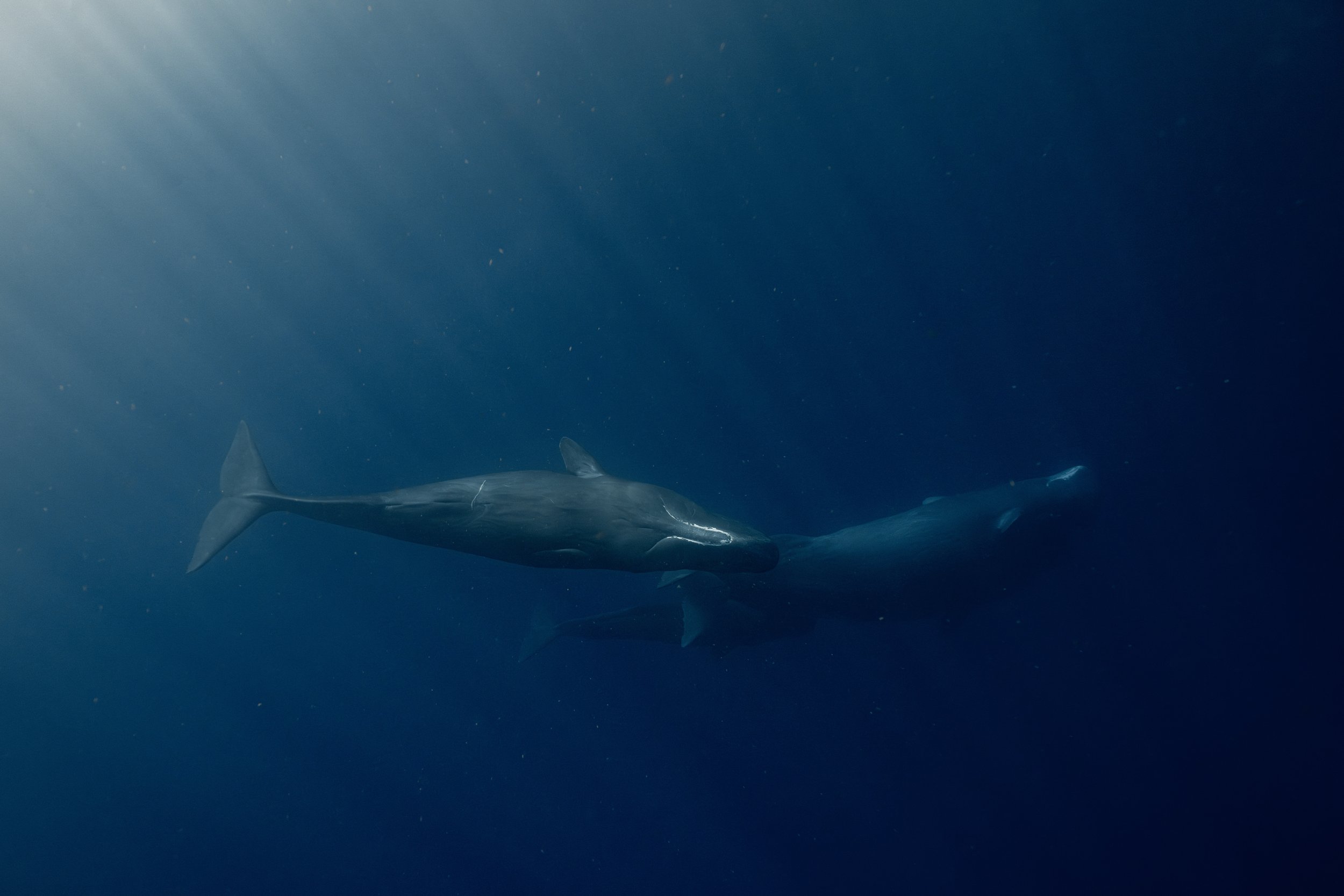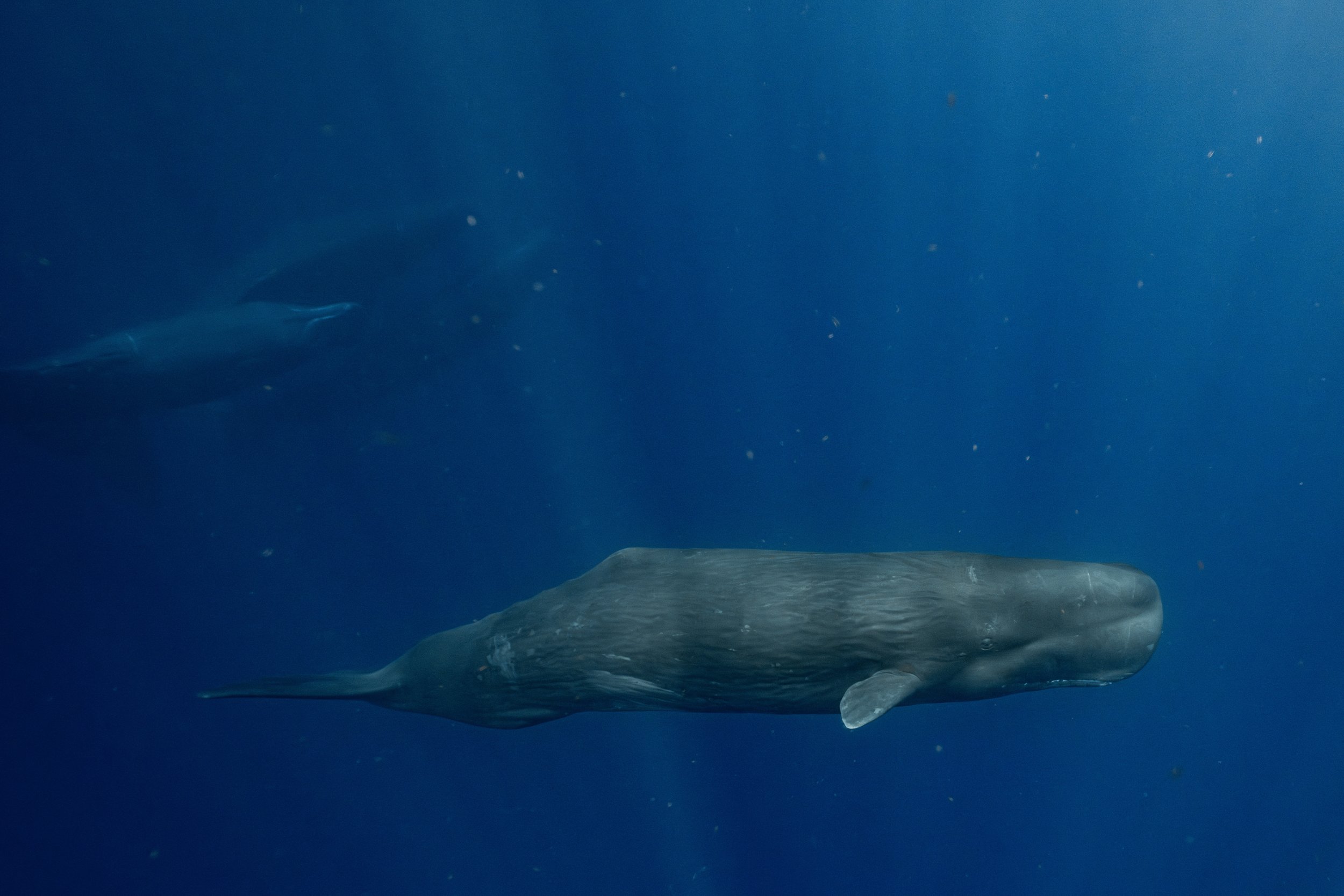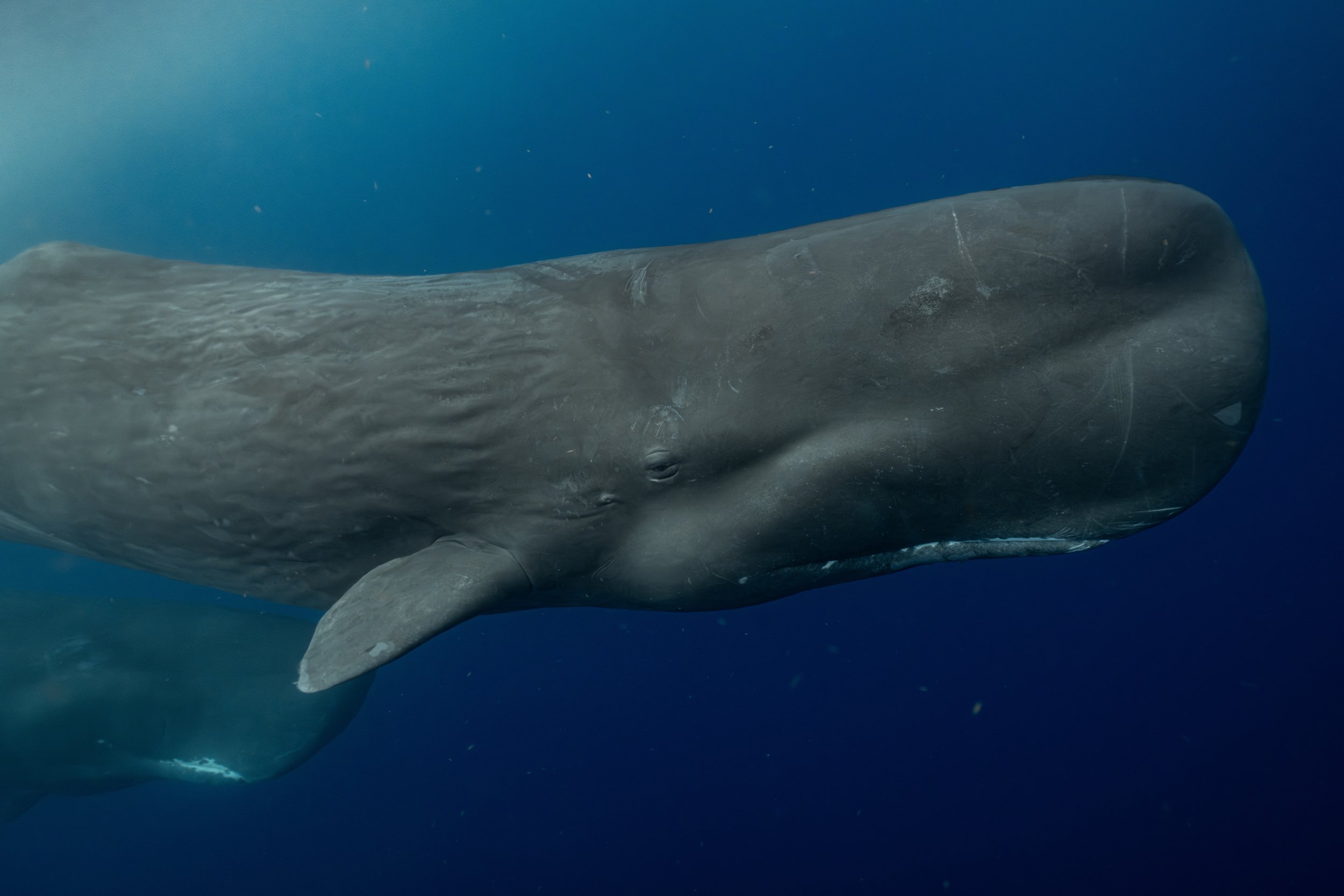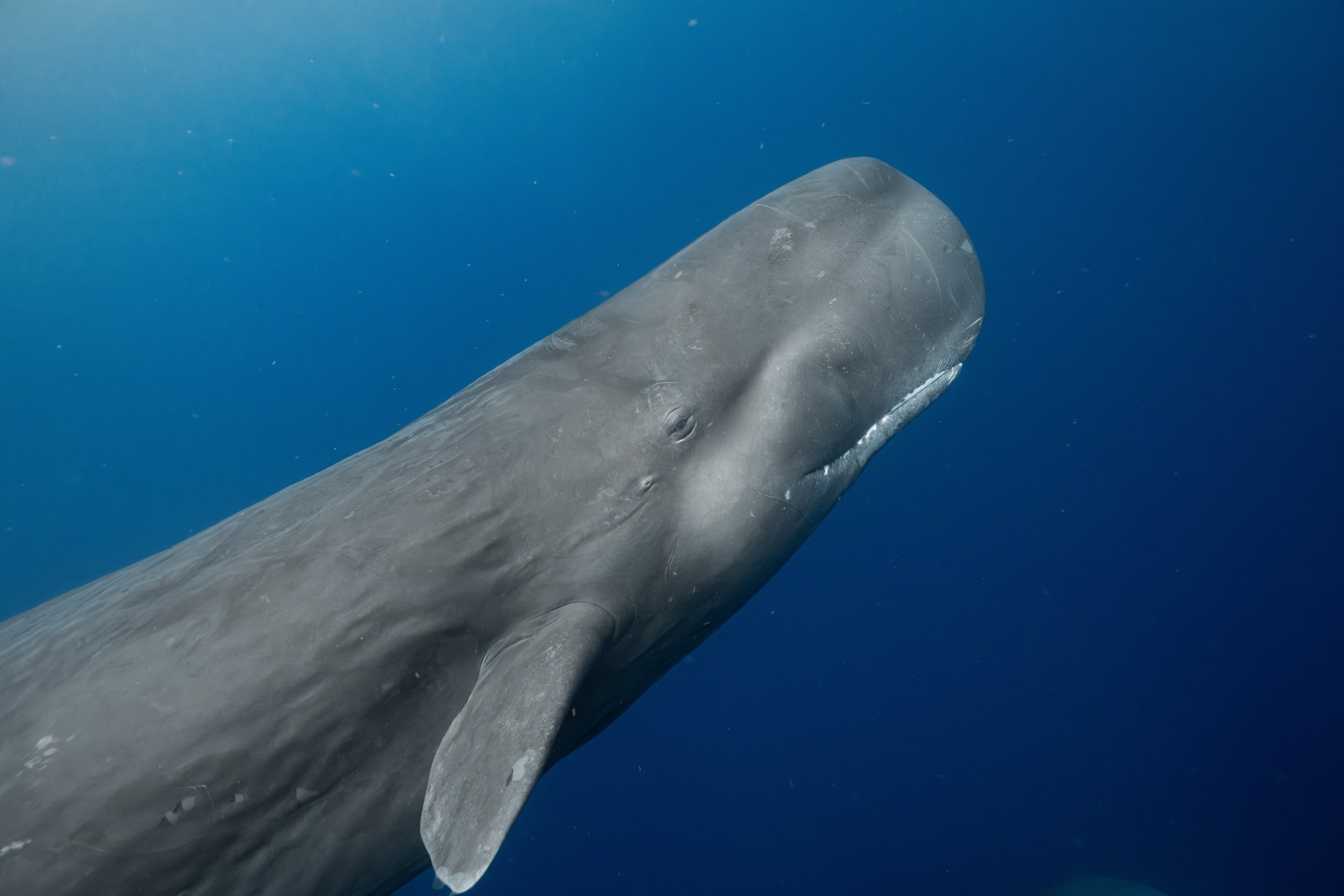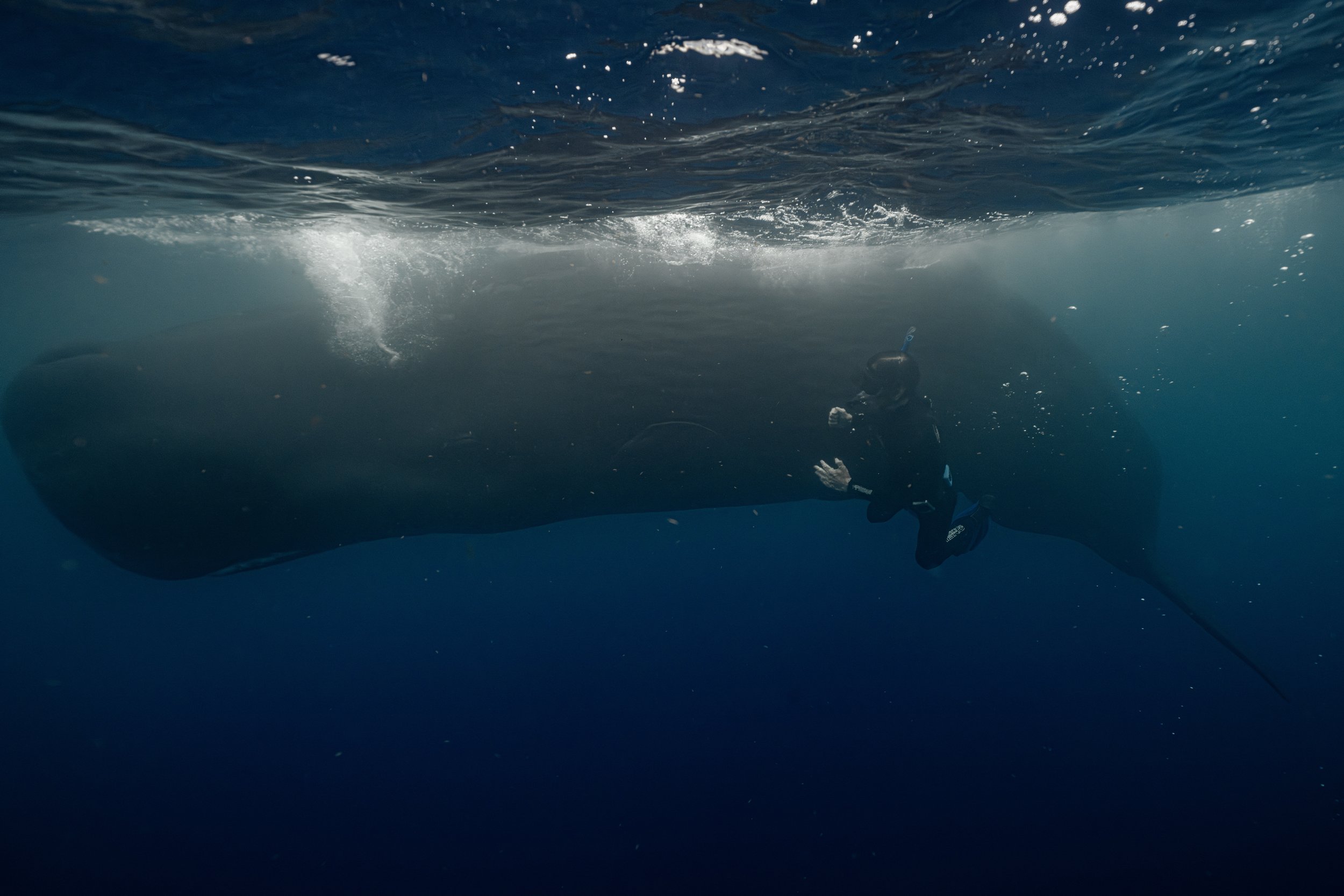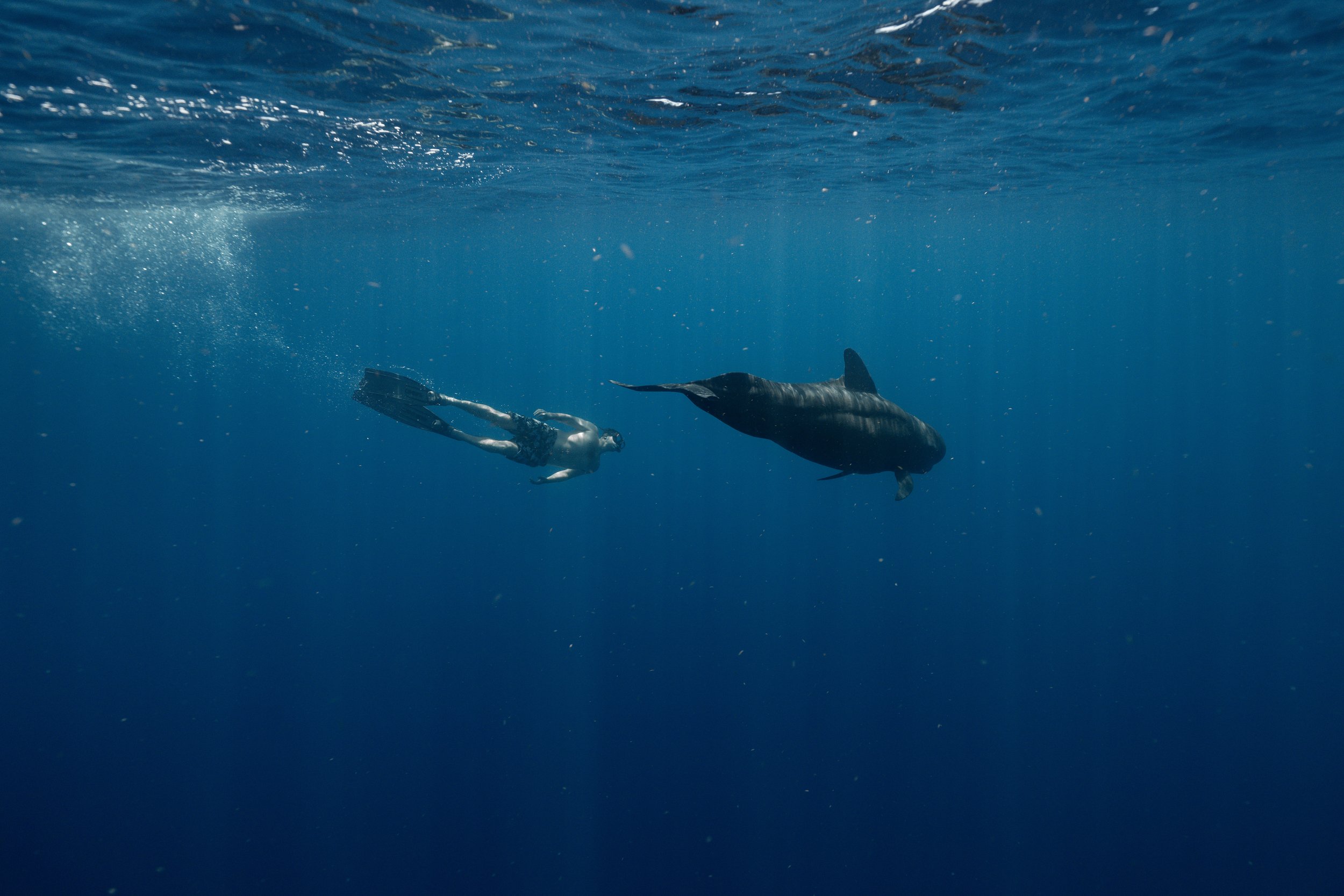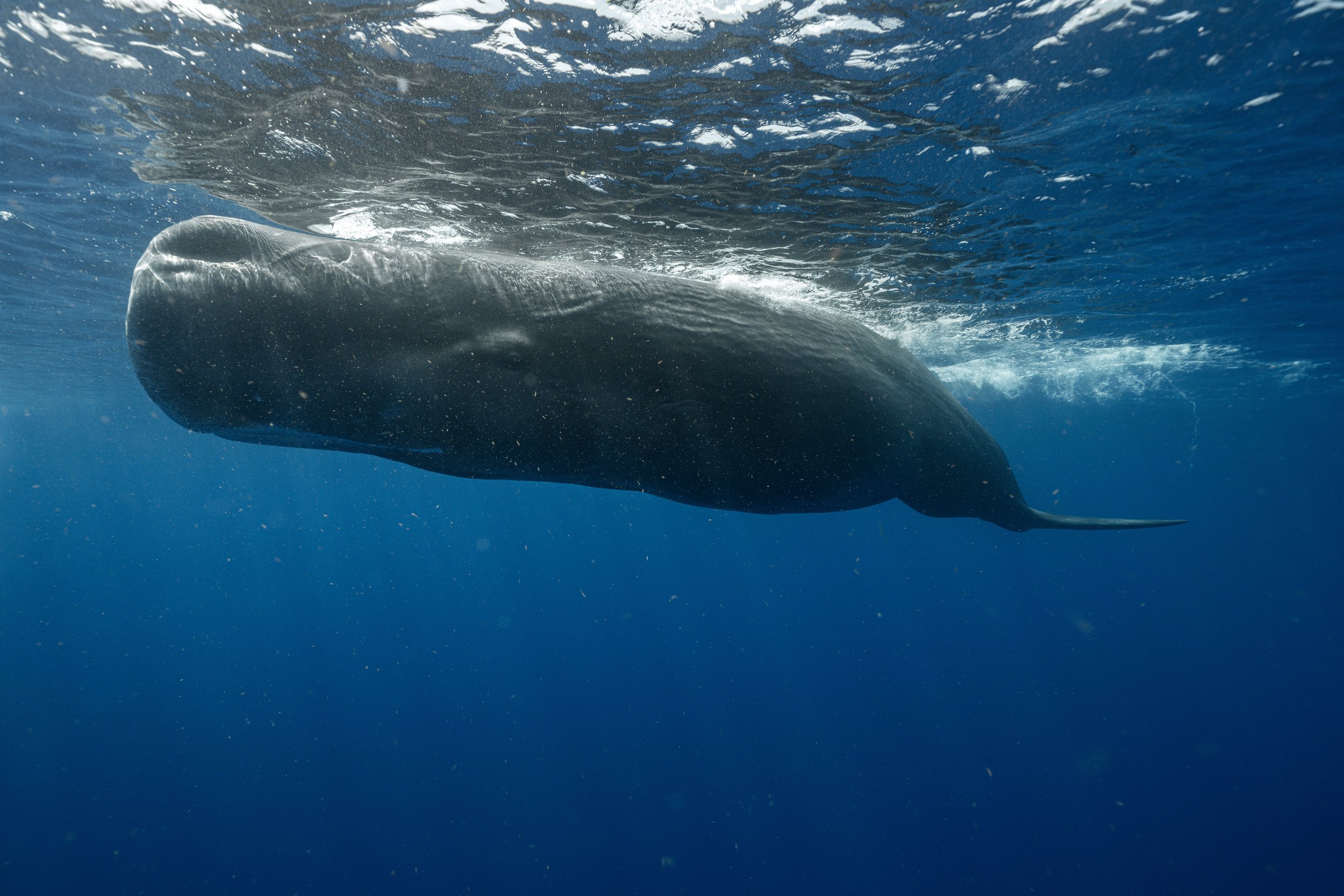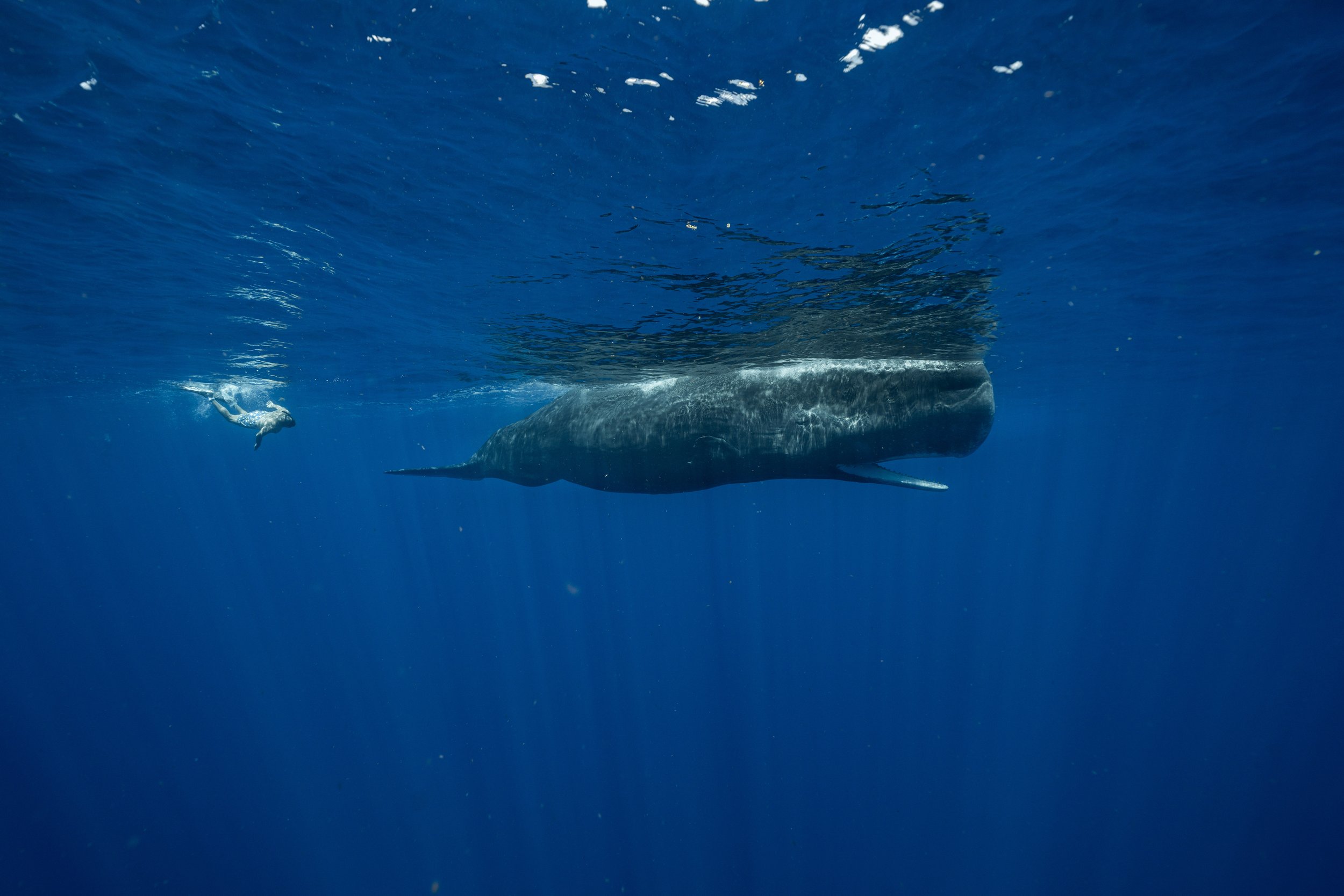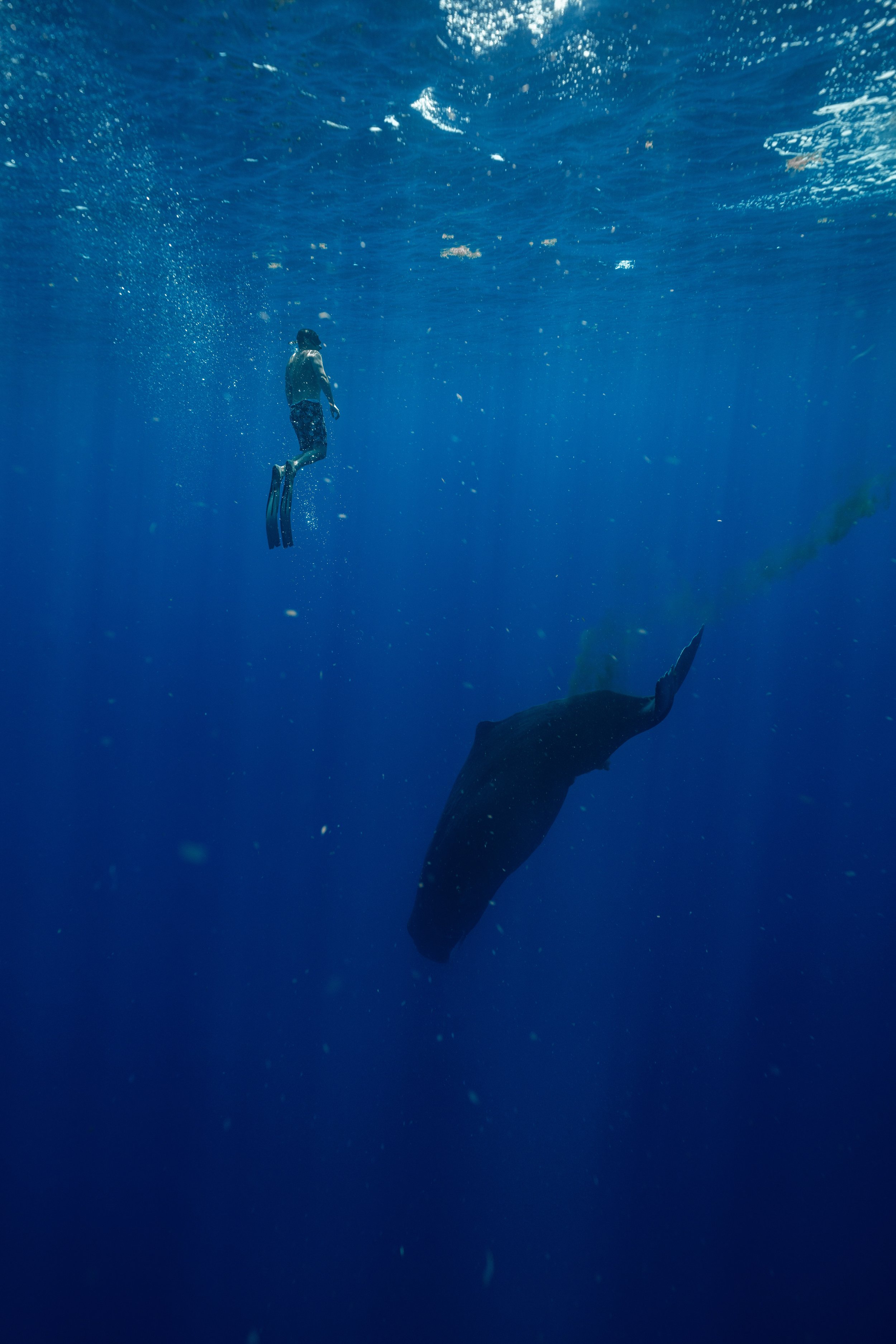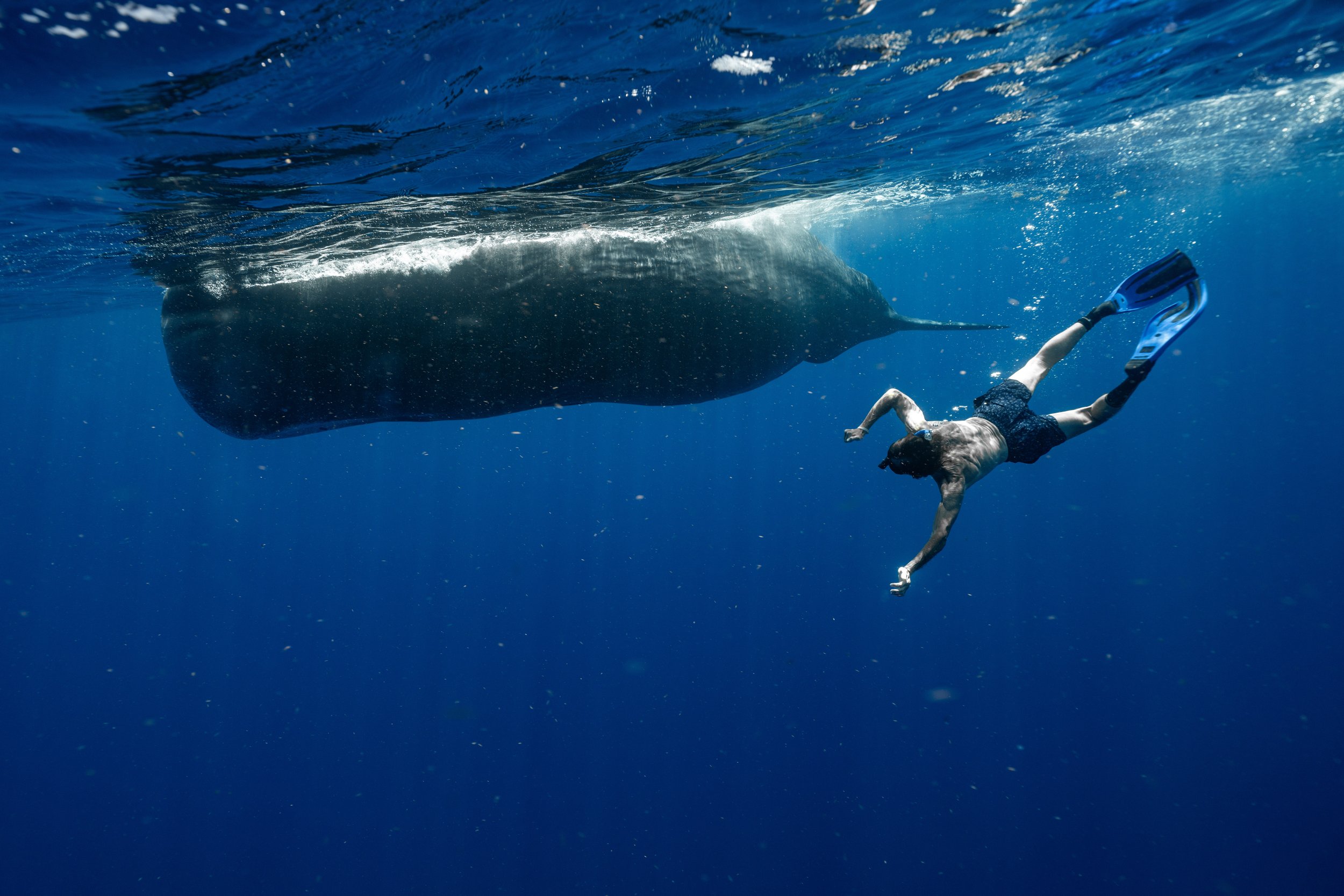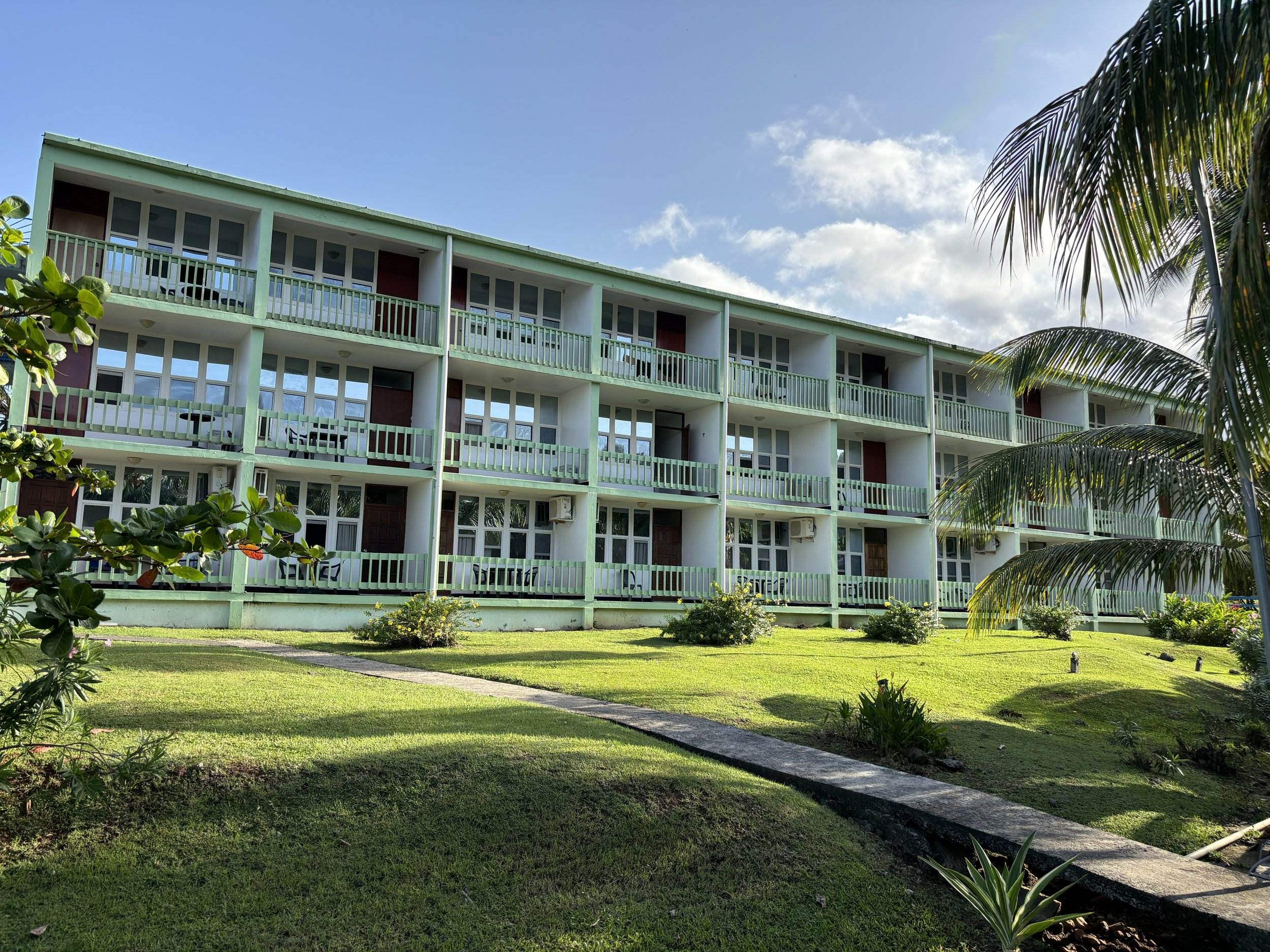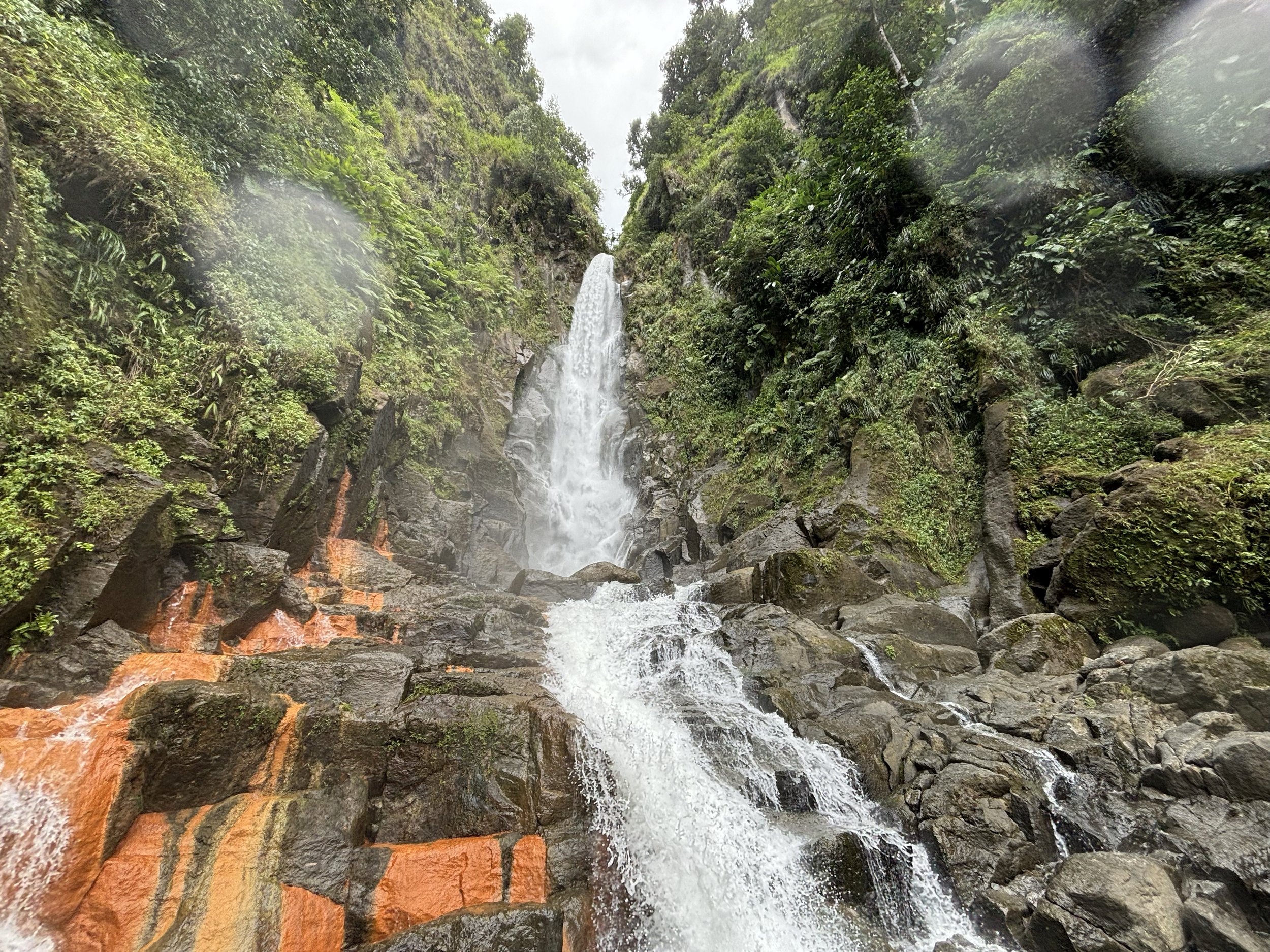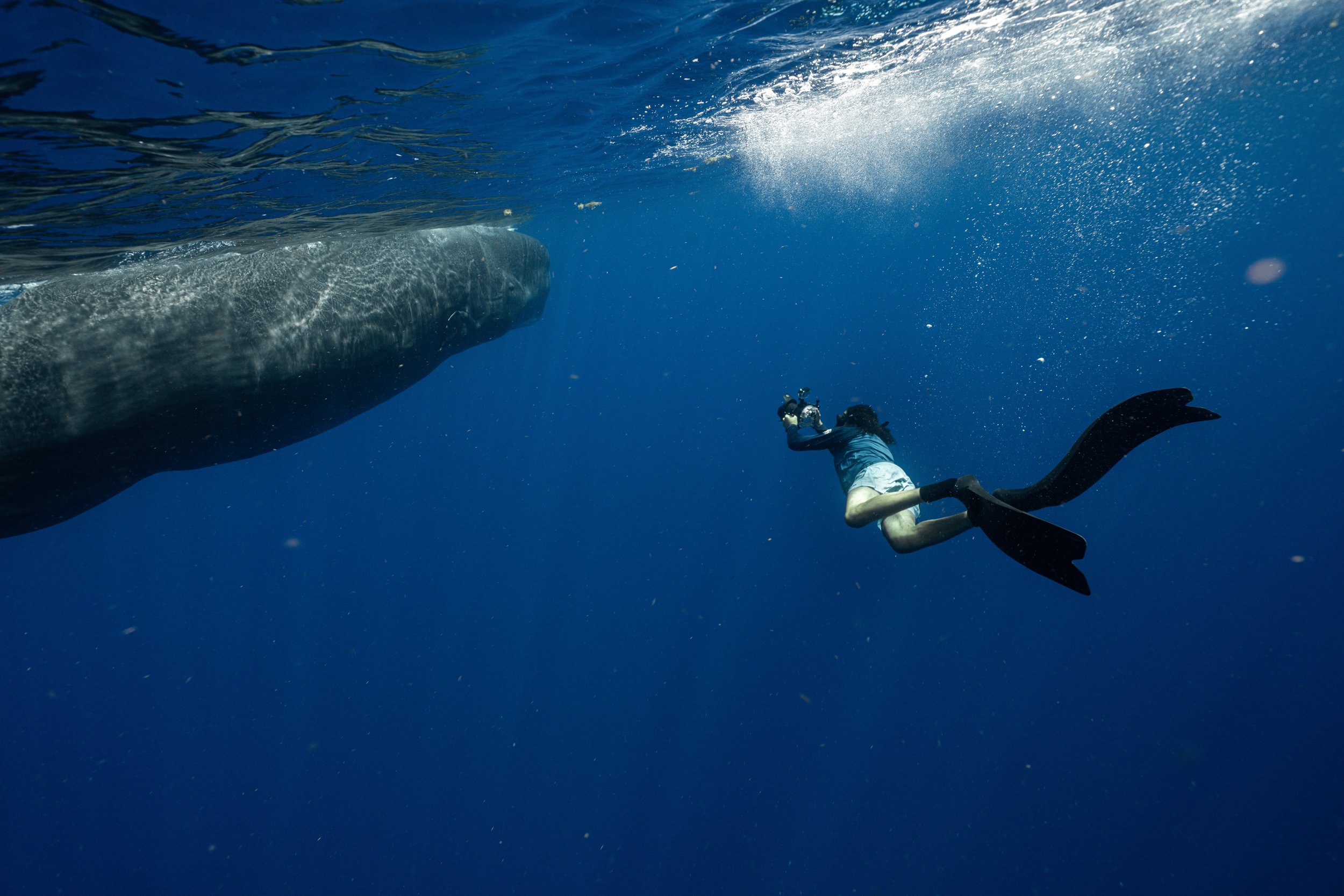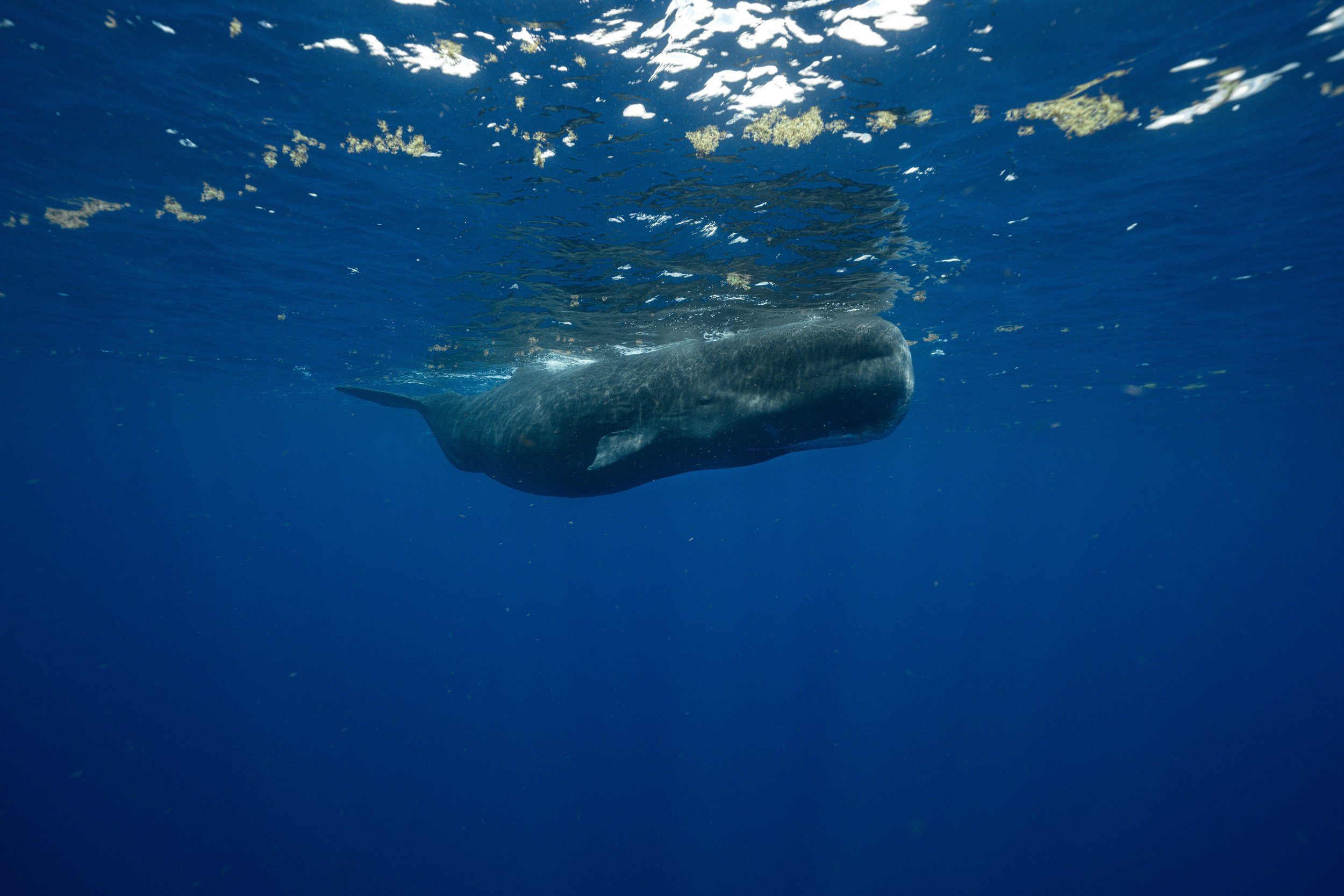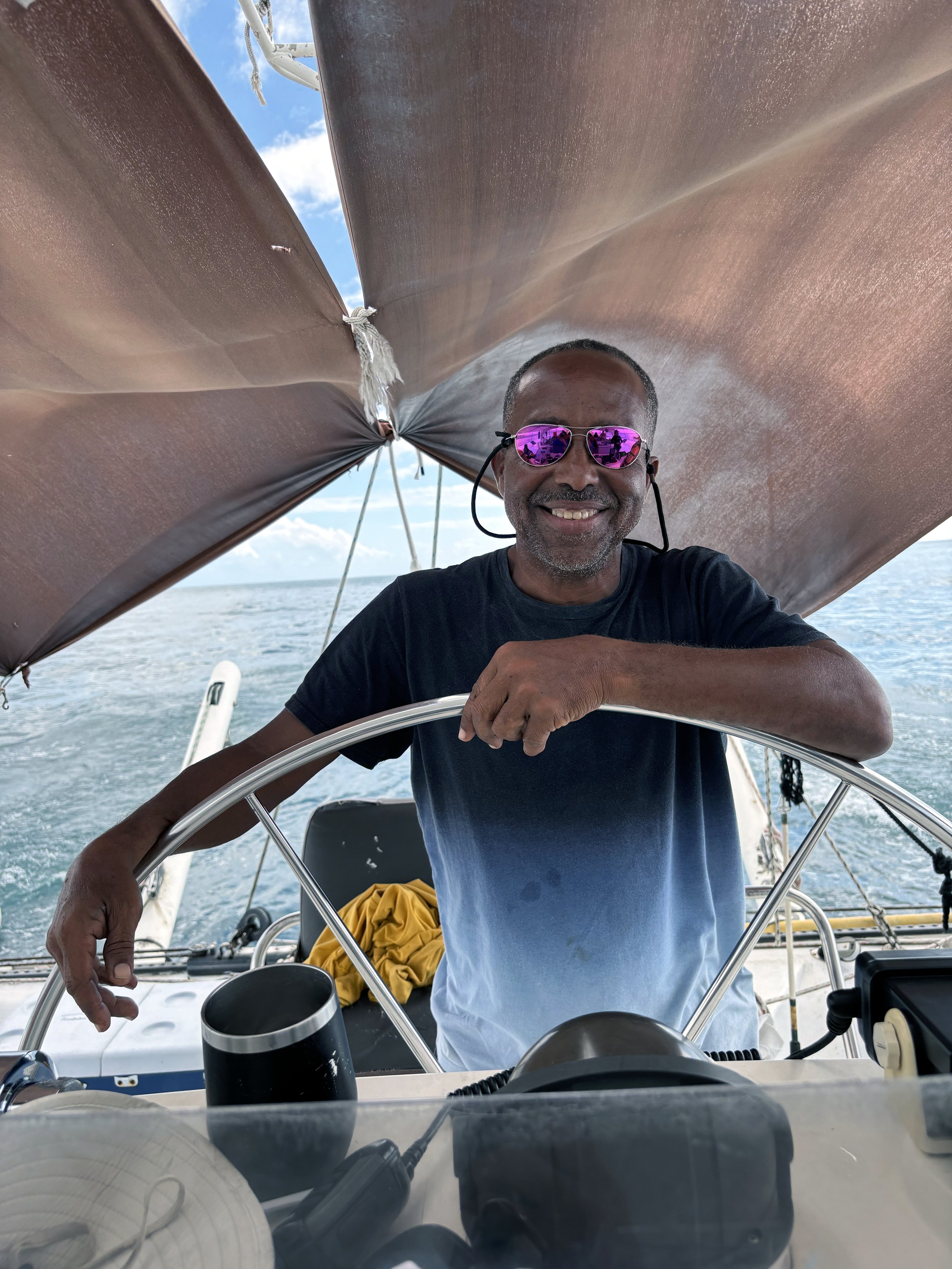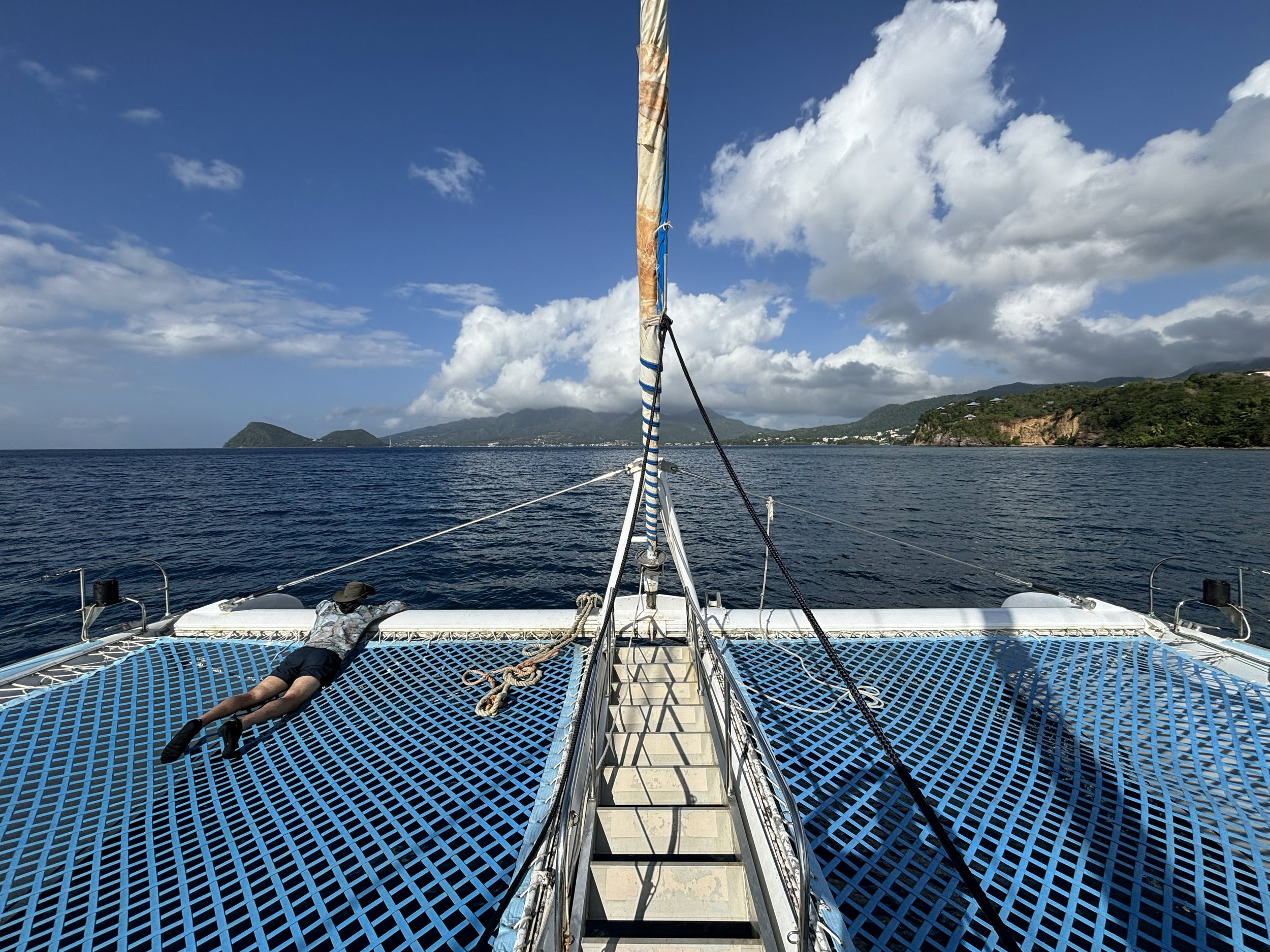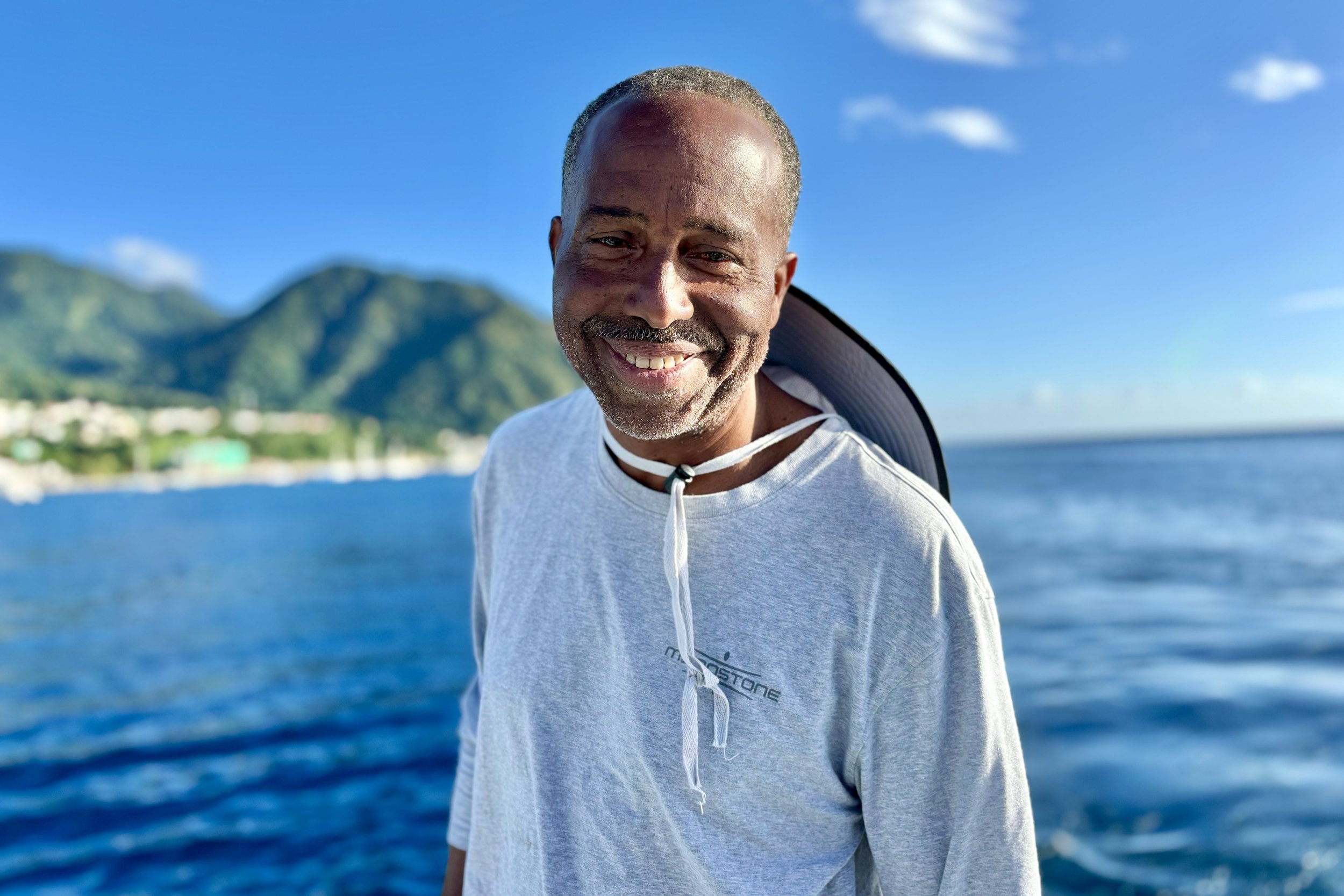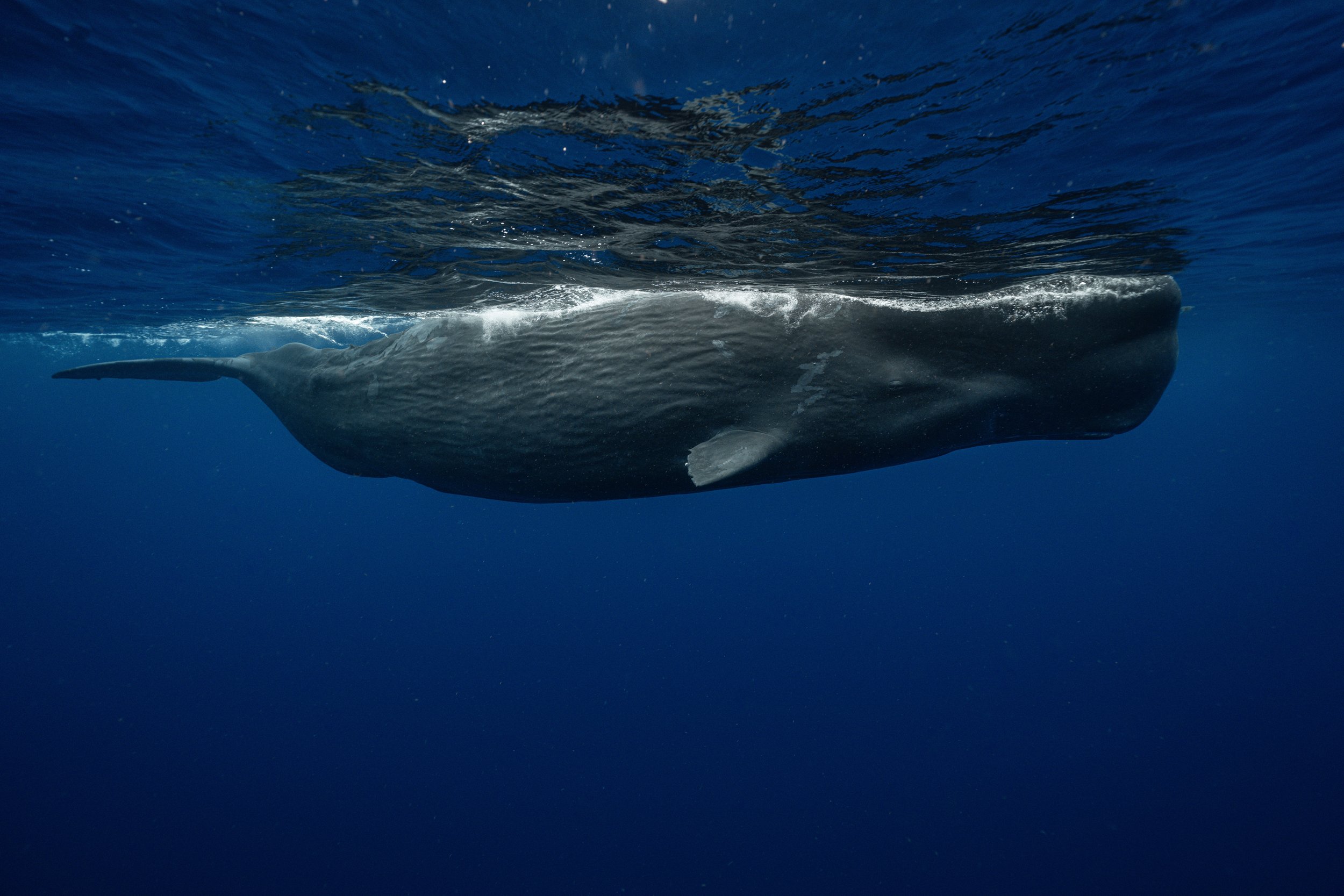
DOMINICA
SWIM WITH SPERM WHALES
Join us in the warm waters off Dominica to swim with sperm whales. This resident population of nearly 300 individuals is native to the southeastern Caribbean. You will learn about these incredible animals, their habitat, and their behavior with our captain and crew. The government of Dominica sanctions this activity and permits are required to get into the water with sperm whales.
-
Strong swimming skills- you must be able to swim at least 200 meters unaided in open water. No certification is required to participate in this program. This trip is open to all adult participants.
-
This trip spans one week from Saturday to Saturday. With each trip, we include five full and permitted days on the water and spend approximately seven hours on the boat during these on-water days. Each trip also includes a full land excursion day to enjoy Dominica’s waterfalls, fresh water gorges, and hot springs.
-
$5600 USD per person (single supplement).
+$800 beach cottage upgrade.
Accommodation upgrades to beach cottages (paid) are available based on availability.
Service level:
This trip is designed to be an immersive pelagic and social adventure. This means we stick to local involvement and integration as much as possible. It’s comfortable, fun, and dynamic, but not luxury.
Your meals are locally prepared, the crew is run by two generations of a local Dominican family, and the accommodations are local family-owned.
You can expect beachfront accommodations with clean and basic rooms. All rooms have air conditioning and hot water showers with daily cleaning service. Think about it like this: the accommodation is nice enough to comfortably spend the night but not nice enough to want to spend all day there.
Our boat is a 75-foot catamaran. Comfortable, spacious, and enjoyable with room to wander and relax. It’s not a luxury cat by any means, but it provides an excellent experience for swimming with the whales and bonding with your group and crew.
Included:
Professional photo guide, whale guide, captain and crew, 5 full days on the water, Ministry of Fisheries Permit to swim with sperm whales, 7 nights of accommodation (basic, clean, with a/c and hot water showers, but nothing fancy), breakfasts, lunches, airport pick up and drop off on the start day and end day of the trip, 1 full land excursion day, entrance fees, and payment processing fees by Visa/MasterCard.
Excluded:
Gear (limited rentals available, all participants should bring their own gear), airfare, dinners, insurance, gratuities (optional), optional accommodation upgrades (we offer first come first serve upgrades to beach cottages), and anything not explicitly mentioned as included.
-
This trip is strictly limited to 6 participants.
Only 3 participants with 1 guide are permitted in the water at a time with the whales and the group will split into two groups to rotate out during each surfacing or pass-by.

DAILY PROGRAM
SATURDAY :: ARRIVALS
All participants are met at the airport on arrival and are transferred to Portsmouth, about an hour from Dominica’s international airport. This evening, everyone will get together for a trip briefing, group meeting, and gear check before dinner.
SUNDAY~FRIDAY :: WATER AND LAND
During your week in Dominica, you will have 5 full on-water days and 1 full land excursion day. Every day includes breakfast and lunch, along with 6-9 hours of activities. Our days usually begin at 8 AM and wrap up around 4 PM.
During the evenings, you are free to go to dinner with your fellow participants or make your own arrangements. Our guide on the ground will help get the group dinner reservations every day and has a great list of suggested restaurants in town.
Group dynamics are a key part of this trip and spending time with your fellow participants, crew and guides is one of the most rewarding aspects of any Inertia trip beyond the activities and subject at hand. We strongly encourage group bonding and our guide actively facilitates social activities throughout the trip.
SATURDAY :: DEPARTURES
Transportation back to the international airport is provided for everyone today. No activities or meals are covered for the departure day. The hotel check-out time is at noon.
WATER DAYS
Meet the captain and crew at 8 AM at the restaurant in front of the PBH dock. This is where we load the boat with all the necessary gear for swimming with whales and enjoying your time on the water. Our mornings are generally relaxed; we usually set sail between 8:30 and 9 AM after everything is loaded and prepared. Enjoy a catered breakfast on board as we navigate the twin-engine catamaran out of Portsmouth.
About 2 km offshore, the captain and crew start conducting sound tests with a unidirectional hydrophone, an underwater microphone designed to pick up sounds. Since sperm whales use echolocation and produce clicking noises while diving for prey, we can detect these sounds within a 3-8 kilometer radius, depending on the day's weather and water conditions. This helps us determine the whales' distance and general direction. We perform these tests every 20-40 minutes to pinpoint their location.
In Dominica, the resident whale population off the west coast offers a 65% chance of sighting whales and a 50% chance of swimming with them on any given day. Various factors can influence our success, including predators, migrating males, and weather conditions. Nature is unpredictable, and there are no guarantees.
We spend 6-8 hours on the water each day. If sperm whales are not found, we search for dolphins, pilot whales, and other pelagic species, or explore offshore reefs for snorkeling. We return to shore between 3-4 PM, giving you plenty of time to refresh before dinner.
LAND EXCURSION DAY
Each week has one dedicated land excursion day to allow participants to see and experience some of Dominica outside the ocean. This all-day excursion brings you to hike some incredible waterfalls, swim in a clear freshwater gorge, and soak in the hot springs before having dinner in the capital Roseau. The land day is not always scheduled, as we keep this day flexible to account for rough seas or bad weather at sea.
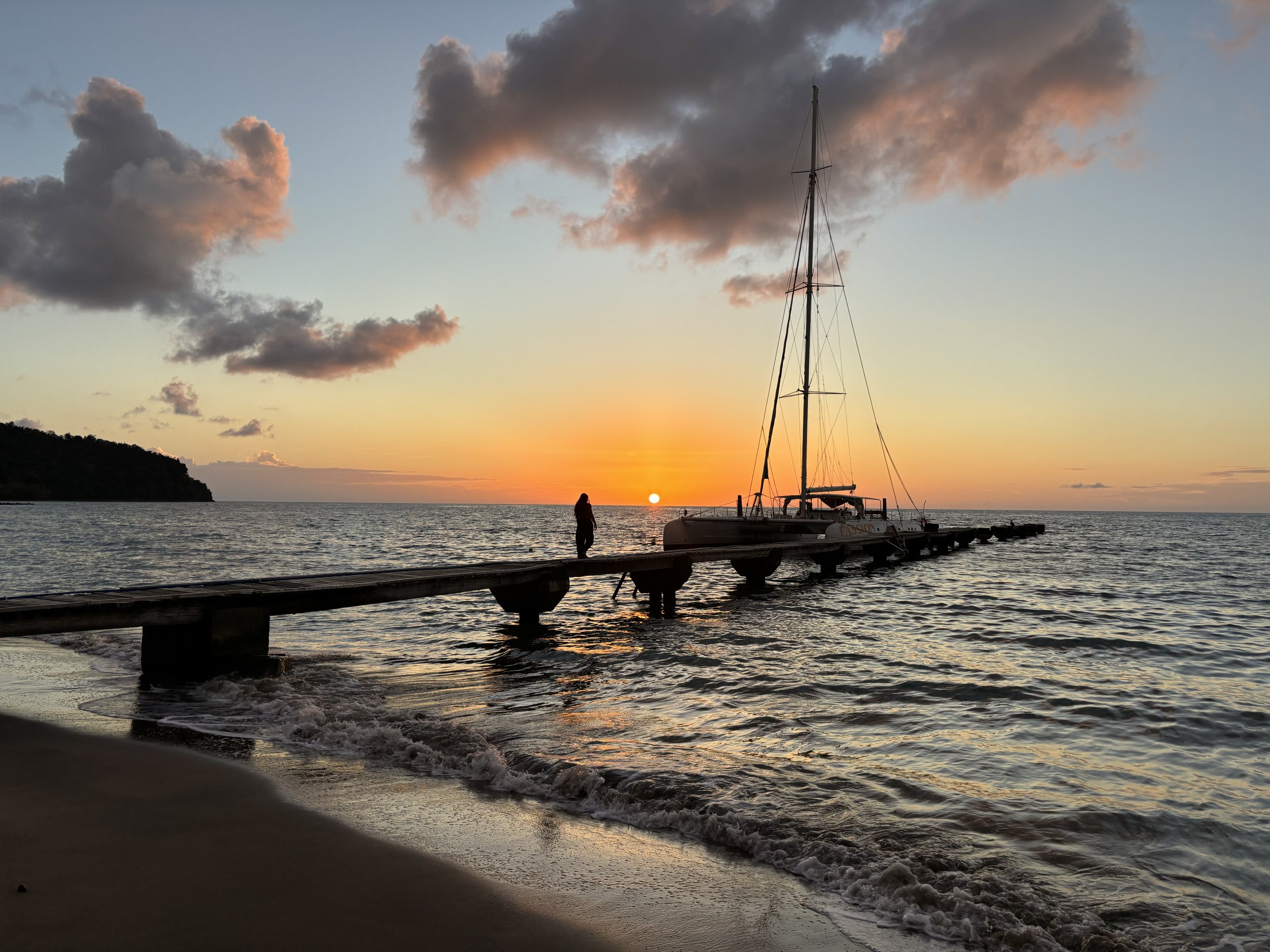
ACCOMMODATION
Our program is hosted at the Picard Beach Cottages / Portsmouth Beach Hotel directly on the beach in Portsmouth, Dominica. The rooms are basic yet come with air conditioning and hot water showers. Our philosophy behind staying here is simple— we want the accommodation to be nice enough to enjoy spending the night, but not so nice as to merit spending the day inside. Upgrades (paid) to private beach cottages are available on a first come first serve basis.
THE CATAMARAN
For this trip, we use a twin engine 75-foot catamaran called “Passion.” Captain Andrew has piloted this vessel for years and it is full of everything we need to have an enjoyable expedition on the water. Given its size, you are able to walk around freely, enjoy home cooked catered meals on board, relax on the nets, and hide from the sun under the shaded interior. The catamaran’s size and stability helps make a smooth journey even in the channels should the whales pull us out there.
THE ISLAND
Dominica, often called the "Nature Island" of the Caribbean, is a haven of pristine natural beauty, characterized by lush tropical rainforests, dramatic waterfalls, and bubbling hot springs. The island's rich cultural heritage is reflected in its population of approximately 72,000 people, who are a blend of largely indigenous Kalinago, African, and European descent, each contributing to the vibrant tapestry of music, dance, cuisine, and traditions that make Dominica captivating.
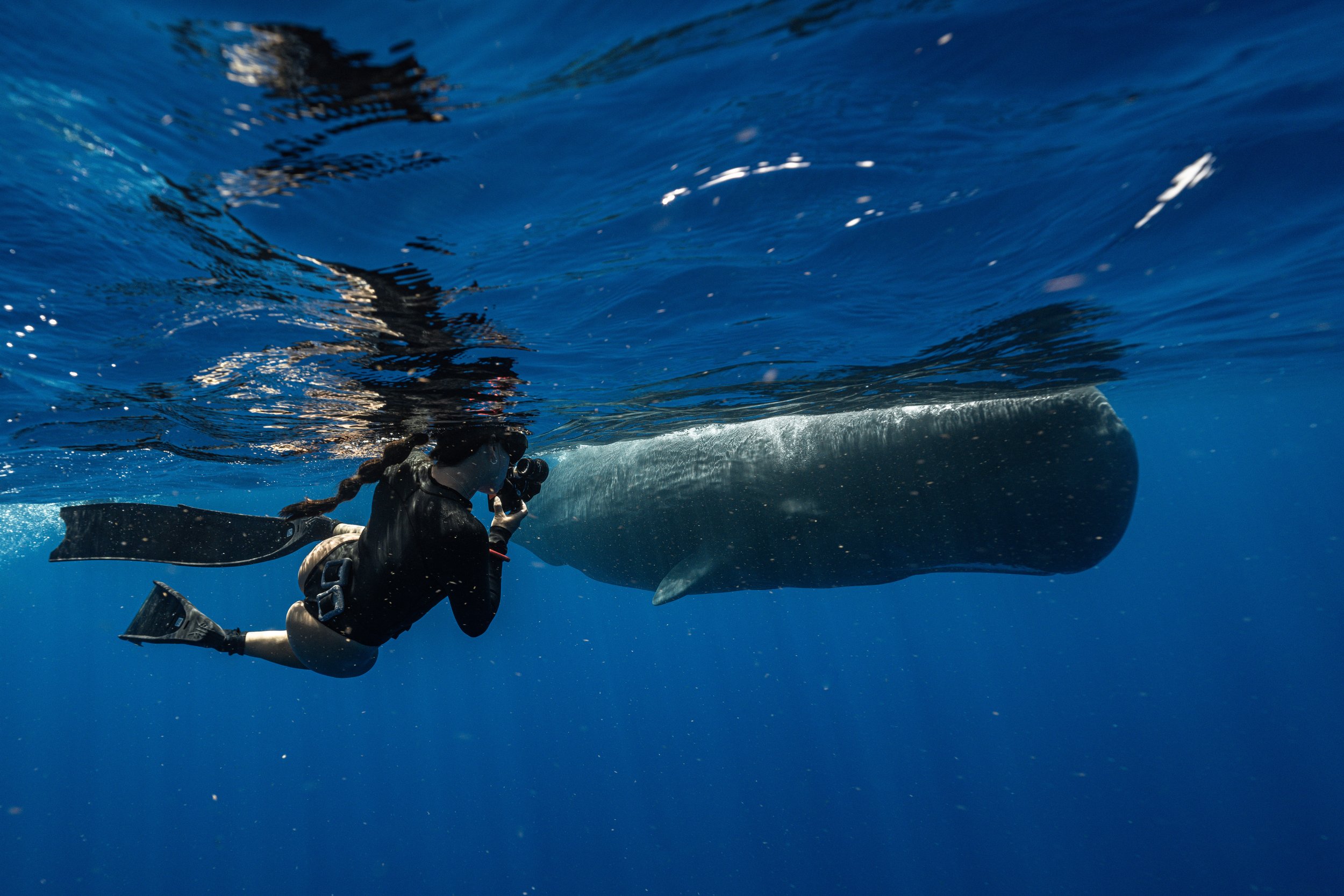
SPERM WHALES
Sperm whales are fascinating creatures, renowned for their distinctive characteristics and behaviors that set them apart in the marine world. As the largest of the toothed whales, adults can reach lengths of up to 18 meters (males) or 12 meters (females), with their massive heads making up one-third of their body length. This feature is not only striking but functional; it houses the spermaceti organ, from which the whale derives its name. The spermaceti, a waxy substance, was historically sought after for use in oil lamps and industrial lubricants.
DIVING AND FEEDING
One of the most remarkable aspects of sperm whales is their deep-diving capability. They are among the deepest diving mammals, capable of reaching depths of over 2,000 meters in search of their primary prey, squid. Most normal dives occur along the drop off at around 400-500 meters, and dives typically last about 45 minutes between 8-15 minute surface intervals, showcasing their incredible adaptations to deep-sea life, such as a flexible ribcage and the ability to slow their heartbeat to conserve oxygen.
Sperm whales use echolocation to navigate and hunt in the dark depths of the ocean. They produce powerful clicking sounds, the loudest animal-made noises on Earth, which they use to locate prey and communicate with each other across vast distances. The noises and clicks produced are distinct amongst a social group, forming a sort of language between them.
SOCIAL STRUCTURES
The social organization of sperm whales is primarily matriarchal, centered around family units consisting of females and their calves. These units sometimes merge to form larger groups known as clans, which share similar vocal patterns and may occupy vast areas of the ocean.
Mature males, on the other hand, lead mostly solitary lives or form smaller, loosely associated bachelor groups. Males are normally kicked out of the clan once they reach maturity, around 18-20 years of age and venture to colder waters to feed on larger prey. Males exhibit a significant sexual dimorphism compared to females, growing much larger and weighing up to 57,000 kilograms.
Female sperm whales on the other hand remain within their maternal groups for life, fostering strong social bonds and cooperative behaviors such as communal care of the young. They inhabit temperate to tropical waters, which provide a safer environment for raising calves.
CONSERVATION
Sperm whales have been immortalized in literature and lore, most notably in Herman Melville's "Moby-Dick." Despite their storied history, they face threats from human activities such as whaling, pollution, and entanglement in fishing gear. 19th and 20th century whaling reduced their population by an estimated one-third.
As of the 1980s, almost all countries have fully banned sperm whale hunting except for two remote villages in Indonesia. Conservation efforts are crucial to ensure the survival of these majestic creatures, allowing future generations to continue to marvel at their unique qualities and behavior.
SWIMMING WITH SPERM WHALES
In Dominica, swimming with sperm whales is a strictly regulated activity. All swimmers must have a Ministry of Fisheries issued permit as well as follow guidelines to ensure the safety of the animals and swimmers alike.
Only three permitted swimmers are allowed in the water with a whale at a time, along with one guide (this means our participants are divided into two groups of swimmers, each alternating a drop with the guide in the water at all times). This is to help ensure minimal disturbance to the whale in addition to monitoring the safety and behavior of swimmers in the water. Swimmers should refrain from making loud noises or splashing and can swim on their sides to minimize their impact in the water.
Swimmers may not touch the whales and must maintain a minimum distance of three meters from the whale. Swimmers may not swim directly in front of a whale, rather, they should be positioned to the side of the whale.
Before any drop into the water, the whale guide should explain the type of interaction they are anticipating to see and the expected behavior of the swimmers.
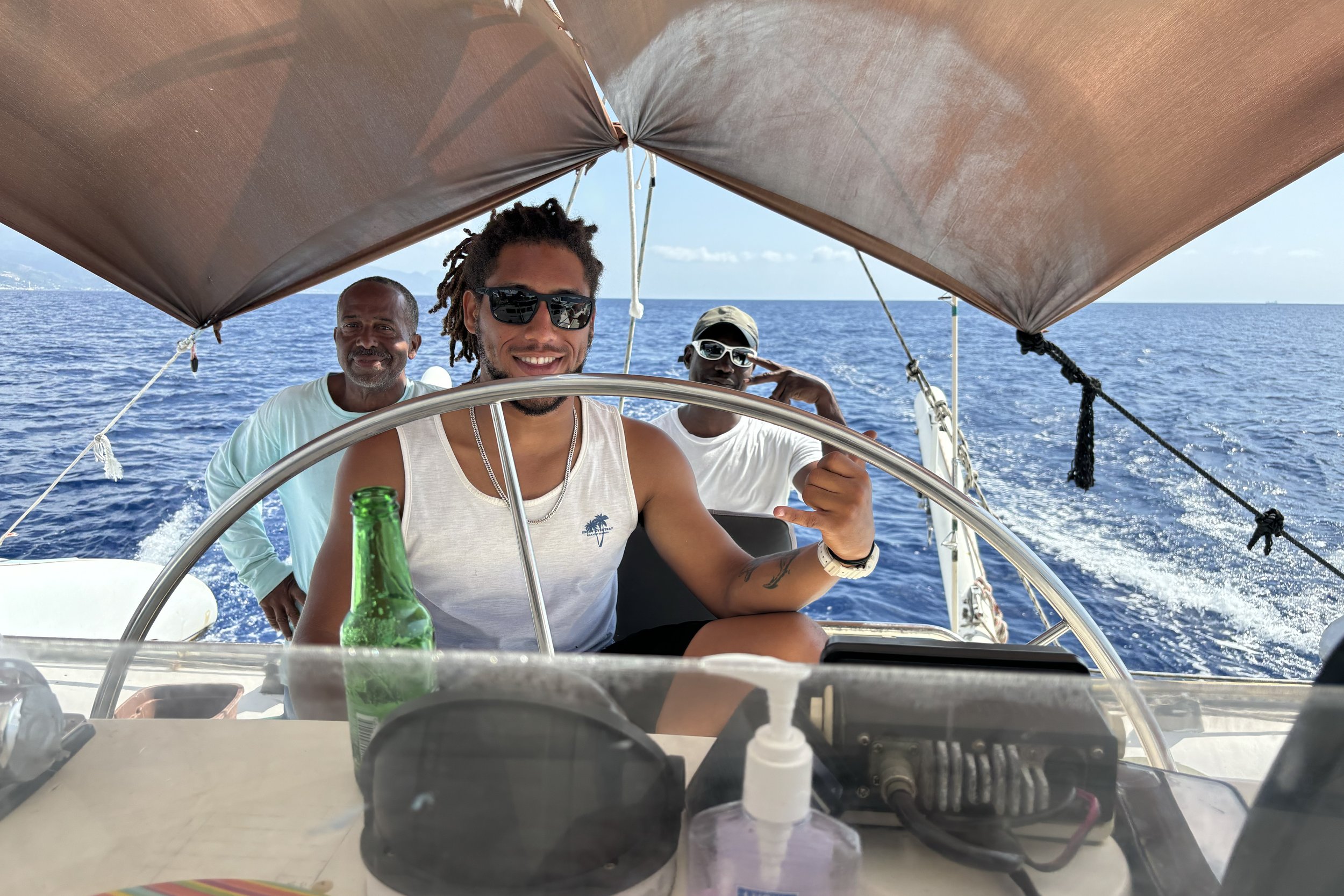
CREW
CAPTAIN ANDREW ARMOUR
Andrew is a local Dominican captain and nature lover who has been swimming with, documenting, and helping others from film crews to researchers to curious tourists engage sperm whales in Dominica since the late 1980s.
He is commonly referred to as Dominica’s “whale whisperer” for having formed deep personal bonds with several members of Dominica’s “group of seven” resident sperm whales. Andrew is the original pioneer of this activity in Dominica and has been guiding for well over 30 years.
Today he still guides while his son Omaya Armour and first mate Wendall Ettienne take over much of the captaining duties on the ship.
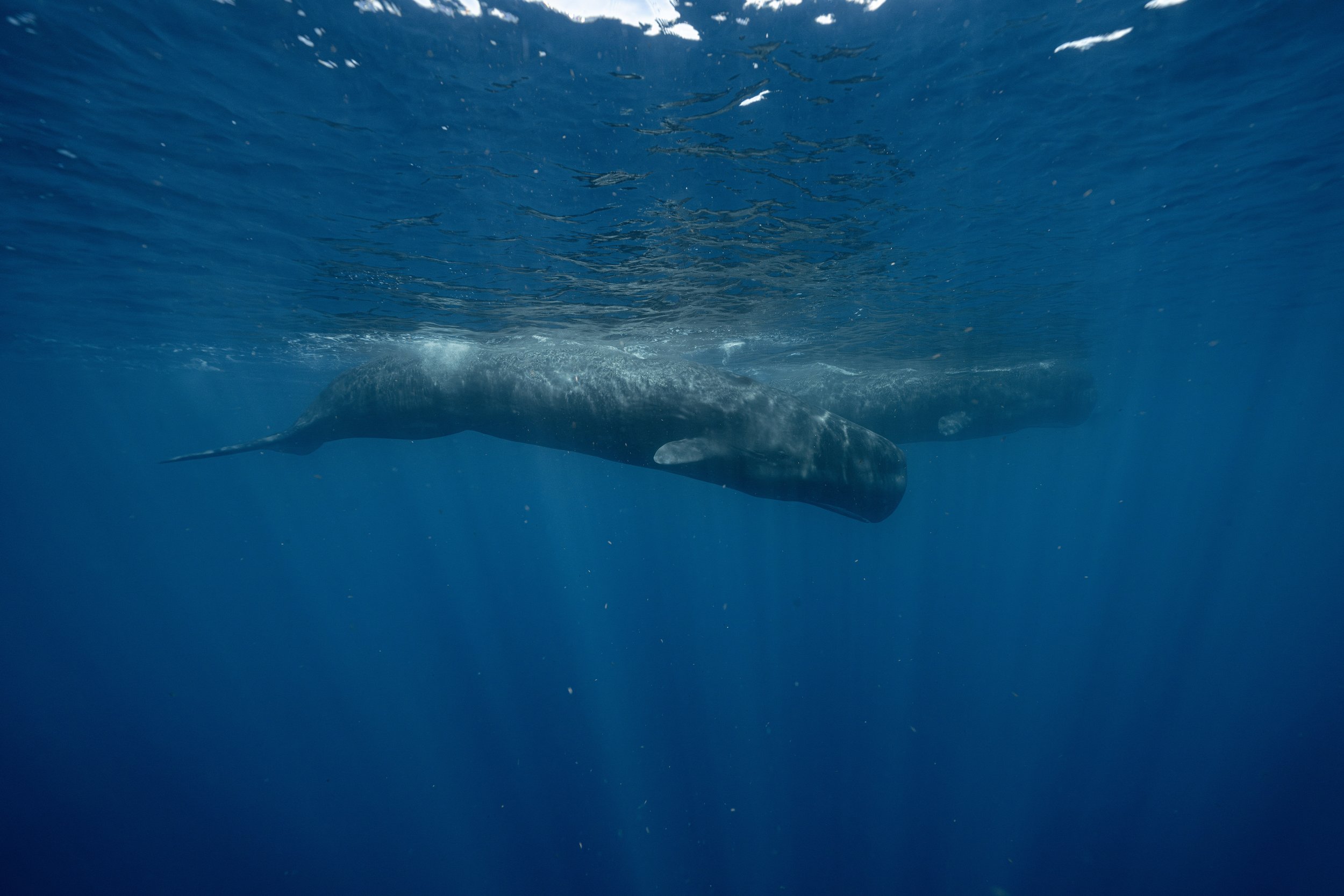
2025 DATES
Session 1 :: March 15-22 :: Trip Leader TBD
Session 2 :: March 22-29 :: Trip Leader TBD
COST
$5600 USD per person (single supplement hotel room)
+$800 USD optional single supplement beach cottage upgrade
-
Professional whale and photo guide
Captain and crew
5 full days on the water
Ministry of Fisheries Permit to swim with sperm whales
7 nights of accommodation (basic, clean, with a/c and hot water showers, but nothing fancy)
Breakfasts
Lunches
Airport pick up and drop off on the start day and end day of the trip
1 full land excursion day
Entrance fees to the national park and hot springs
Payment processing fees by Visa/MasterCard.
-
Gear (limited rentals available, all participants should bring their own gear)
Airfare
Dinners
Travel and medical insurance
Gratuities for local staff (optional)
Optional accommodation upgrades (we offer first come first serve upgrades to beach cottages and solo rooms)
Anything not explicitly mentioned as included.
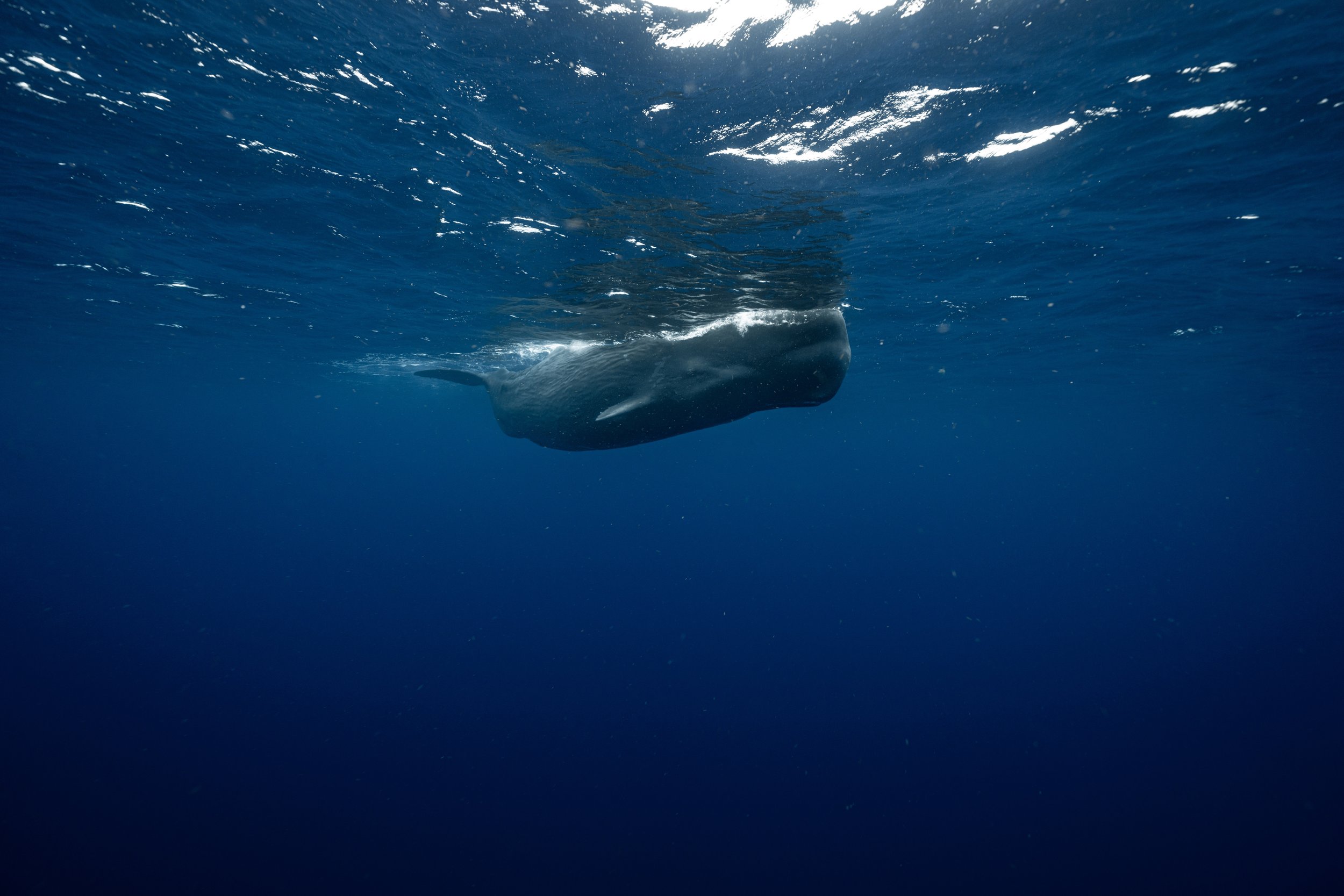
FAQ
-
The best time to swim with sperm whales in Dominica is generally from November to May. During these months, the whales are more frequently observed in the waters around the island, though they are present year-round. Adult males are typically present in February and March. Females and juveniles are resident throughout the entire year.
The summer months are also good times to observe whales; however, they are considerably riskier as June to September mark the hurricane season in the Caribbean.
-
Yes, with proper guidance from experienced whale guides and adherence to safety guidelines, swimming with sperm whales is a safe activity. Our job is to ensure that interactions are respectful to the whales and safe for participants. We only allow three participants with one guide in the water at a time and follow local regulations. While sperm whales are massive predators, they present no aggression nor danger to humans.
-
No specific certification is required for snorkeling with sperm whales, as you will be primarily snorkeling with them at the surface. Strong swimming skills in open water are necessary to participate in this activity. You should be able to easily swim 200 meters unaided in deep, open water.
-
While no wildlife encounter can be guaranteed, Dominica is one of the best places in the world to see sperm whales, as the eastern Caribbean population is resident year-round and the Dominica “group of seven” has been documented by humans since the late 1980s and are essentially habituated to humans.
On average we believe the chances of seeing whales from the boat after hydrophone tests are about 60-70% every day, while the chances of successfully getting into the water with them are about 50% every day.
We often have high success rates, but it's important to remember that sightings can vary. We have had lucky weeks that swim with the whales every day and unlucky weeks that have gotten totally skunked.
-
This entirely depends on the interaction and conditions of the day. Normally with pass-bys, you can get about 3 meters from a whale.
-
Besides sperm whales, you may see dolphins, pilot whales, false killer whales, sailfish, turtles, and a variety of tropical fish and coral species. Dominica's waters are rich in biodiversity.
-
We spend between 6-8 hours per week on the water and run each of our trips with 5 on-water days.
This is because our permit allows us to use the boat for 10 days over a two-week period, so we split those days between two groups.
For those interested in staying longer, we can offer a discount for people looking to do 10 on-water days.
-
Yes, it's crucial to choose operators and boat captains committed to sustainable and respectful wildlife tourism practices. This includes limiting disturbances to the animals, not positioning motorized boats too close to the whales, adhering to strict guidelines on interactions, and supporting conservation efforts.
Likewise, human behavior needs to be respectful toward the whales— this means not touching them, not swimming directly at them, not swimming in front of their heads, and not chasing them. Humans should swim parallel to the whales at a distance of 3 meters or more from the whale.
-
Because swimming with sperm whales in Dominica is an expensive investment, we require all participants to bring their own gear that they are sure will fit them perfectly. Rentals are available on an emergency basis, but we really don’t suggest using any rental equipment.
The way we see it, if you’re already paying the boat costs, permit, and tour fees to swim with sperm whales, to use rental gear that does not fit your face or give you the proper propulsion in the water is a shame.
All participants should bring at minimum a mask, snorkel, and long fins that they are comfortable using, fit their faces and bodies, and give them enough power to swim quickly and silently in the water.
A full packing list is provided to all participants before their trip.
-
You can book a trip with us by checking the available dates above and choosing the date that works best for your schedule.
A non-refundable, non-transferable deposit is needed to secure your spot. You may check our standard Terms and Conditions here regarding cancellations and deposits.
